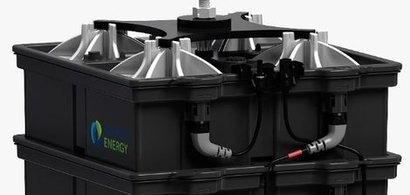
The two companies have partnered with Re-Energy Co. Ltd and Eiwat Solar Co. to supply Kyushu Electric with power generated from the environmentally friendly, scalable, modular solar power and storage system. It will feature Schneider Electric’s Conext XW+ controller, an adaptable single-phase and three-phase hybrid inverter with grid-tie functionality and dual AC power inputs that provides power conditioners for both solar power and storage capabilities in a single unit. Power generated from the solar array will be stored in Aquion’s Aspen 48M-25.9 battery - an advanced saltwater storage battery that is safe, environmentally friendly, efficient and highly scalable.
Based on Aquion’s sustainable Aqueous Hybrid Ion (AHI) technology, the battery is engineered to meet Cradle to Cradle certification standards. It is the only battery in the world to have achieved this certification and is designed for hassle-free, long duration operation in stationary, deep cycling applications. The project is Aquion’s largest in Japan to date.
“We are delighted to partner with Schneider Electric, Eiwat and Re-Energy on this exciting project, which represents our largest deal to date and the first in Japan” said Scott Pearson, Chief Executive Officer, Aquion Energy. “As more utilities and renewable energy developers around the world search for a safe and truly renewable alternative to lithium-ion storage solutions, we see a significant opportunity for continued expansion into global markets for our Aspen battery series.”
By establishing Eiwat Storage I as a model case, Eiwat, Schneider Electric, and Re-Energy will be able to swiftly construct a solar power system that utilises advanced Aquion Energy Aspen batteries, demand for which is expected to increase in the future. This system can be applied to public facilities and datacenters because Aquion AHI batteries are completely non-flammable and non-explosive.
Aquion Energy utilises batteries that are composed of a safe water-based electrolyte, as compared to the flammable organic solvent in lithium ion batteries and caustic sulfuric acid in lead acid batteries. This water-based system moderates the maximum temperature that the battery can reach – it is impossible for any internal reactions to drive the battery above 100°C, since at this temperature, all of the water will evaporate leading to an open circuit condition. Aquion’s batteries will not require “explosion safe bunkers”in homes as is being considered in Australia and possibly New York City, and can be safely installed in basements because - simply - there is literally zero risk of fire or explosion.
The company’s proprietary Aqueous Hybrid Ion (AHI) batteries are designed for long-duration, stationary energy storage applications. The company’s Aspen product line is optimised for daily deep cycling for residential solar, green architecture, off-grid and microgrid, telecom towers, energy management, and grid-scale applications, providing flexible, modular energy storage that enables broad adoption of renewable energy technologies such as wind and solar. This in turn delivers reduced reliance on fossil fuels and optimisation of existing grid-tied generation assets.
Image: Aquion Energy
For further information:

